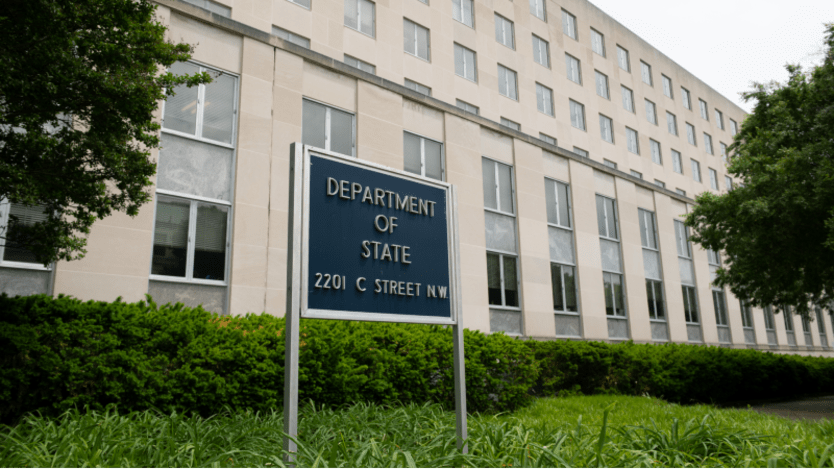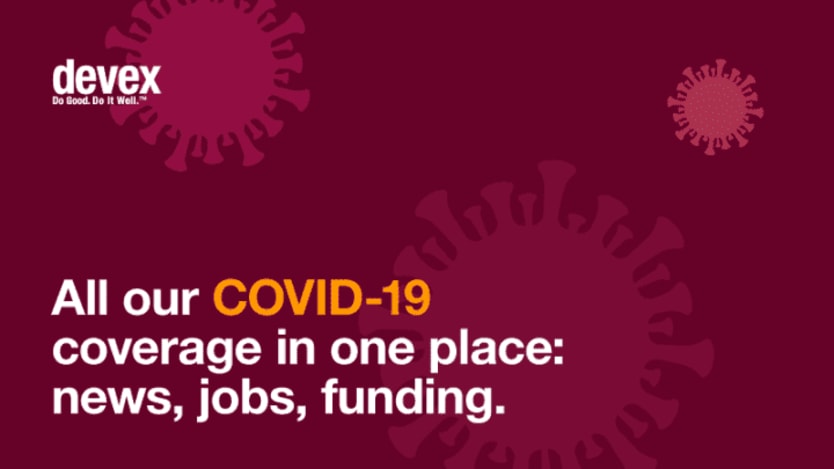White House pandemic proposal would 'dismember' USAID, says former administrator

BURLINGTON, Vt. — A draft White House plan for a new pandemic initiative would “dismember” USAID and “gut” the agency’s international disaster response office, a former administrator of the U.S. Agency for International Development warned on Tuesday.
“There are a couple proposals before us,” said Andrew Natsios, who led USAID during the George W. Bush administration, during an online event at the Center for Strategic and International Studies.
“The one before the [White House National Security Council] basically would dismember AID and move the largest bureau with the most funding with the most success record … to the State Department,” he said, referring to USAID’s Bureau for Global Health.
Natsios warned that the same proposal “would gut the Office of Foreign Disaster Assistance” at USAID by shifting its emergency health programs to the State Department and that separating public health from USAID’s emergency food and nutrition programs would — unintentionally — “kill a lot of children.”
The draft White House proposal was first reported by Devex on May 22 after it was discussed at a National Security Council deputies' committee meeting. The plan, according to documents obtained by Devex, would see the creation of a new initiative called the President’s Response to Outbreaks — or PRO — which would consist of a whole-of-government effort overseen by a coordinator at the State Department, and a new central fund for pandemic preparedness.
“There’s widespread absence of trust in the White House and in executive branch intentions.”
— Stephen Morrison, senior vice president, CSIS“Who should run this? OFDA and the Global Health Bureau — their budgets are controlled by State already. If there’s a problem, I don’t understand why State hasn’t dealt with it,” said Natsios, who is currently an executive professor at Texas A&M University.
“I don’t know what more control you need,” Natsios added.
James Richardson, director of the State Department's Office of Foreign Assistance Resources, participated in the CSIS event but declined to discuss details of the initiative, which is still under discussion. According to Stephen Morrison, senior vice president at CSIS and director of its Global Health Policy Center, President Donald Trump has not yet signed off on the proposal.
“There’s widespread absence of trust in the White House and in executive branch intentions — a fear that any initiative that emanates from the White House or State Department may be used to gut important health programs at USAID and [the Centers for Disease Control and Prevention], and/or the World Health Organization,” Morrison said.
On May 29, Trump announced that he plans to “terminate” the U.S. government’s relationship with WHO, while offering no additional details about how that would happen or what the White House would do to maintain global health programs that work in coordination with the international body. Some have interpreted the White House proposal as a potential U.S.-led alternative to WHO.
“We need to make sure that we fill strategic gaps in the international system. Let’s just be completely honest. The international system of the WHO and others have failed us when it comes to outbreaks,” Richardson said Tuesday.
“Let’s go ahead and build the system that can fill the strategic gaps of the ... WHO and others, because we need to take this seriously and we need to make sure we are building something that works in the future,” Richardson added.
The Trump administration’s draft proposal has been countered by bipartisan legislation in the U.S. Senate, which proposes a similar new initiative for global health security, but which supporters say establishes clearer guardrails around USAID’s programs and funding and cedes less authority to the State Department.
That bill — the Global Health Security and Diplomacy Act — was introduced on May 21, the day before the White House draft proposal was first reported.
“It’s not an accident that the bill was introduced before the white paper was leaked,” said Joan Condon, professional staff member with the U.S. Senate Committee on Foreign Relations and architect of the Senate bill, who also participated in Tuesday’s event.
“As with any initiative, it’s important for Congress to lay a marker and make it clear where we agree and provide guidance in the areas where we might disagree,” she said.
“A serious legislative proposal will always have three elements — It will have bipartisan support in Congress, it will have champions in the executive branch, and it will have community consultation and buy-in,” Condon said.
Condon emphasized that the Senate bill “would not give the coordinator authority over USAID,” “would not fold USAID into the Department of State,” and “would not replace the World Health Organization.”
As efforts to create new or enhance current U.S. global health security efforts move forward, they will do so in a difficult political environment and in the face of competing priorities that have already demanded unprecedented resources from the federal government.
Morrison noted that USAID and CDC “feel that they are insecure and under siege,” and that “it’s a difficult moment to begin engaging those institutions around institutional and organizational changes where they may fear they are going to lose out.”
Sen. James Risch, the chairman of the Committee on Foreign Relations, is “serious” about the proposal contained in the bill he has sponsored, despite some political risk, said Condon.
“He understands the risk he has assumed as a fiscally conservative Republican from Idaho, in cycle, leading on a bill that would authorize $3 billion to help other countries prepare for and respond to other disease threats in the midst of a pandemic that has decimated local economies here at home and claimed more than 105,000 American lives,” she said.
Visit our dedicated COVID-19 page for news, job opportunities, and funding insights.

Search for articles
Most Read
- 1
- 2
- 3
- 4
- 5








